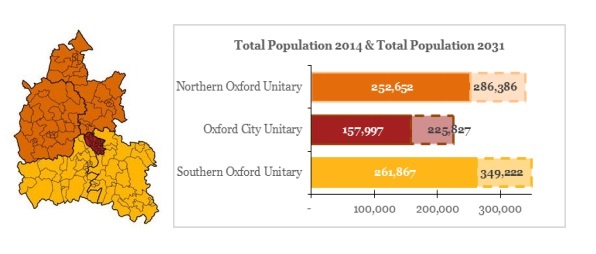18.08.16
Oxfordshire devo model still unresolved as single unitary council proposed
Councils and residents in Oxfordshire will now have to work together to decide the best way forward for the region’s devolution after two reports recommended different political structures: one favoured three unitary councils working together through a combined authority, and the other preferred the sixth option of a “strategic unitary council”.
One report, commissioned by the county council in May and produced by Grant Thornton, concluded that the option to create a single county-wide unitary authority would deliver the most savings, and would eliminate the need for a special agreement with central government to reallocate funding – with the new entity starting with a balanced financial position.
The arguments listed in favour of the single unitary council, including unifying currently disjointed services, clarifying democratic accountability and responsibility, the freedom to develop a single vision and voice, larger resilience to unexpected pressures, and a bigger ability to address strategic issues.
“Detailed proposals are at an early stage, but it would be intended that the strategic unitary body would retain responsibility for decisions affecting Oxfordshire as a whole, including infrastructure, transport and housing,” the report said. “It would also determine policy for adult social care and public health services, integration of services with health partners, and children’s services – meeting need and determining the allocation of resources across the county.”
The second report, commissioned by the district council and carried out by PwC, recommended replacing the current two-tier system of local government with new unitary authorities that would be accountable for all services in their area, “at a level which reflects the diverse characteristics and different interests across the county”.
“This would reduce confusion and complexity, enable greater joining up of decisions and deliver significant efficiency savings whilst ensuring all services are responsive and accountable to local communities,” the PwC report said.
The three unitary authorities it proposed are: Northern Oxfordshire, comprising of current Cherwell and West Oxfordshire District councils; Oxford City, comprising of current Oxford City Council; and Southern Oxfordshire, comprising of current Southern Oxfordshire and Vale of White Horse district councils.

“A combined authority would be established as a statutory collaborative vehicle for leaders of the district unitary authorities to work in partnership with the LEP and CCG to manage services that need to be coordinated over a wider area, drive transformation and deliver the devolution deal,” the report added.
Cllr Ian Hudspeth, leader of Oxfordshire County Council, welcomed both reports together so that residents and those with an interest in public service can “make up their own minds”.
“Once we have all had the opportunity to consider both reports report in detail, I will be looking to work with the districts on areas of common ground in the hope of finding a way forward in the interests of residents of Oxfordshire,” he continued.
“It is clear that real progress will only be made through joint working with the districts and other public service providers, and I will do whatever I can to make sure that happens.”
Speaking on behalf of the city and district councils, Cllr Matthew Barber, leader of Vale White Horse District Council, said the two studies proved there are different alternatives for how local government is organised, with different views to back these up.
“Following discussions with civil servants, it is clear that the new government's priorities in this area have changed and they are looking to councils to develop consensus about governance arrangements to support a devolution deal,” said Cllr Barber.
“There are also many commonalities in the findings of the two studies and it is important that all councils now take some time to fully consider all of the evidence and how this might fit with the government's priorities as they emerge over the autumn.
“We are committed to working together with Oxfordshire County Council in the best interests of our residents and over the coming months we will be working jointly to agree a way forward with government.”
Have you got a story to tell? Would you like to become a PSE columnist? If so, click here.